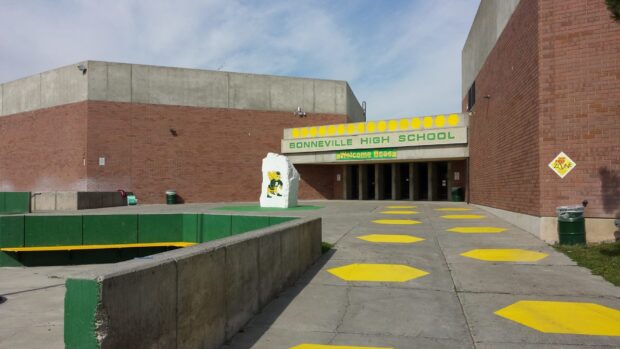A total $164.2 million in school funding hangs in the balance this month as bond and levy requests hit ballot boxes May 18.
On May 18, 14 districts will look to bankroll new schools, teacher salaries and more using local property taxes. Many will reup existing levies, while others are making adjustments as temporary federal relief money flows in and as growing districts’ needs rise.
Others, warning of cuts to day-to-day operations, will try again after failed funding asks earlier this year.
Voters in two districts, Nampa and Idaho Falls, will try to recall a school board trustee. Read more on that here.
This election is by no means historic in size; just two months ago, $299.6 million were on the table. But it does signify districts’ last chance at securing additional funding until August, when districts will already be two months into their next budget year.
Bonneville: Ten-year, $28 million plant facilities levy; two-year, $11.6 million supplemental levy.
The largest school levy request on Idaho ballots this election cycle will be a rerun in two respects.
The district is asking voters for the same amount per year that its two expiring levies provide. A $5.8 million supplemental and $2.8 million plant levy are both on their way out in 2020.

The vote will also be the second time in roughly two months the district has tried to renew its levies. On March 9, voters struck down a pair of heftier asks, for an annual tax of $3.8 million for a plant levy and $6.8 million for a supplemental levy. Those levies would have amassed $38 million and $13.6 million over their lifetimes, respectively.
In March, the plant facilities levy pulled only 41 of the 60 percent support it needed to pass. The supplemental levy, which needed a simple majority, received 42 percent support.
“I think we have an obligation to go back out,” school board trustee Paul Jenkins said in March, according to EdNews. He cited a local voter turnout of around 12 percent in the last election.
The district’s supplemental levy funds teacher and classified staff salaries, music programs, physical education classes and other operational costs, district spokesman Phil Campbell said in a video about the levy ask. Some of those services will likely be cut if the levy fails, he said, though according to the district’s website, an injection of one-time federal coronavirus relief dollars could serve as a temporary stopgap.
The county is set to receive $11.2 million as part of the latest round of federal, though money must be used for select federally-approved purposes. The district is set to receive $11.2 million of that.
Emmett: $68 million bond issue. A new high school would consume the majority of the 30-year bond’s funding, though a new gymnasium and renovations to elementary, middle and high school buildings would also be financed, according to the Emmett Messenger Index.
Property tax rates would rebound to around their 2018 level, when a 20-year bond expired. Rate increases would be around $194 per $100,000 of a property’s assessed value, not counting breaks and exemptions like the homeowners exemption.
Jerome: $27 million bond issue. The district hopes to fund a new K-6 school plus additions and renovations to Horizon and Jefferson elementary schools. Administrators hope to reduce overcrowding and increase funding for transportation, effectively shortening bus routes. The bond issue wouldn’t raise or lower taxpayers’ rates, as it would refinance the district’s existing debt.
A similar $26 million ask was rejected a year ago. It nabbed 62% of the vote, falling short of the two-thirds supermajority it needed to pass.
Post Falls: Two-year, $9.9 million supplemental levy. The vote would renew an expiring levy of the same amount. The outgoing funding accounts for 7.5 percent of the district’s budget, paying for staffing, athletics and technology.
West Bonner: Two-year, $6.9 million supplemental levy. An increase of $433,000 over the district’s expiring $6 million levy would help repair school heating systems and roofs.
Mountain View: One-year, $3.1 million supplemental levy. Seeking $800,000 less than its last levy, which expired last year, the district is looking to make facility upgrades with the bulk of its money.
Whitepine: One-year, $880,000 supplemental levy. Levy funding would stay flat, replacing an expiring tax of the same amount.
Salmon River: One-year, $515,000 supplemental levy. Voter approval would cause a $10,000 dip in funding from a one-year levy passed last year.
Teton County: Five-year, $2.5 million plant facilities levy. The renewed levy would tax the same amount as an expiring levy, passed in 2016. It would pay for building and technology upgrades.
Nezperce: One-year, $445,000 supplemental levy. The levy renewal would fund operational costs at the same price as an expiring one-year levy.
Firth: Ten-year, $4 million plant facilities levy. The levy would replace both an expiring $950,000 plant levy and a $600,000 supplemental levy; the latter won’t be off the books until 2022. Would include building repairs, including to its track and auditorium.
New Plymouth: Two-year, $700,000 supplemental levy. This renewal is the same size of its $700,000 predecessor, passed in 2019.
Cottonwood: One-year, $275,000 supplemental levy. The levy signifies a $50,000 decrease from its expiring levy. The dip will be offset by incoming federal stimulus money, Superintendent Rene Forsmann told the Lewiston Tribune. After that, the district plans to raise its levy request to 2020 levels.
Meadows Valley: Two-year, $434,000 supplemental levy. That’s an increase from the current $378,000 levy.
Idaho Education News data analyst Randy Schrader contributed to this report.
